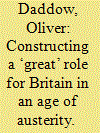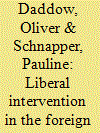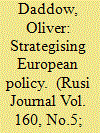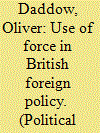|
|
|
Sort Order |
|
|
|
Items / Page
|
|
|
|
|
|
|
| Srl | Item |
| 1 |
ID:
141730


|
|
|
|
|
| Summary/Abstract |
This article interprets the ideational underpinnings of the British Conservative–Liberal coalition government’s foreign policy from 2010 to 2015. It uses qualitative discourse analysis of speeches, statements and policy documents to unpack the traditions of foreign policy thought which informed some of the key foreign policy practices of the coalition government. The analysis centres on the British identity constructed by liberal Conservatives, and the values and interests flowing from this baseline identity that the government’s foreign policy sought to express through its foreign policy. Liberal Conservative foreign policy is argued to have been an attempt to come to terms with the limits on Britain’s international agency in the face of three major foreign policy dilemmas: the legacy of the New Labour years, dramatically reduced economic resources in the ‘age of austerity’ and an increasingly restricted capacity for Britain to exercise ideational entrepreneurship in the international community. The article substantiates the claim in the extant literature that liberal Conservatism significantly adapted but did not restructure an established British foreign policy tradition of merging values and interests in complex ways.
|
|
|
|
|
|
|
|
|
|
|
|
|
|
|
|
| 2 |
ID:
120454


|
|
|
|
|
| Publication |
2013.
|
| Summary/Abstract |
David Cameron was a critic of Tony Blair's doctrine of the 'international community', which was used to justify war in Kosovo and more controversially in Iraq, suggesting caution in projecting military force abroad while in opposition. However, and in spite of making severe cuts to the defence budget, the Cameron-led Coalition government signed Britain up to a military intervention in Libya within a year of coming into office. What does this say about the place liberal interventionism occupies in contemporary British foreign policy? To answer this question, this article studies the nature of what we describe as the 'bounded liberal' tradition that has informed British foreign policy thinking since 1945, suggesting that it puts a distinctly UK national twist on conventional conservative thought about international affairs. Its components are: scepticism of grand schemes to remake the world; instinctive Atlanticism; security through collective endeavour; and anti-appeasement. We then compare and contrast the conditions for intervention set out by Tony Blair and David Cameron. We explain the similarities but crucially the vital differences between the two leaders' thinking on intervention, with particular reference to Cameron's perception that Downing Street needed to loosen its control over foreign policymaking after Iraq. Our argument is that policy substance, policy style and party political dilemmas prompted the two leaders to reconnect British foreign policy with its ethical roots, ingraining a bounded liberal posture in British foreign policy after the moral bankruptcy of the John Major years. This return to a pragmatic and ethically informed foreign policy meant that military operations in Kosovo and Libya were undertaken in quite different circumstances, yet came to be justified by similar arguments from the two leaders.
|
|
|
|
|
|
|
|
|
|
|
|
|
|
|
|
| 3 |
ID:
141670


|
|
|
|
|
| Summary/Abstract |
As David Cameron moves towards a renegotiation of the UK's terms of membership of the EU and an in/out referendum, he will confront a series of strategic challenges. Oliver Daddow argues that the prime minister will first have to develop a convincing pro-membership narrative against the backdrop of an EU in crisis and a widespread antimembership movement in the UK, given voice by a generally EU-hostile media.
|
|
|
|
|
|
|
|
|
|
|
|
|
|
|
|
| 4 |
ID:
088651


|
|
|
|
|
| Publication |
2009.
|
| Summary/Abstract |
Operation Allied Force had a decisive impact on Tony Blair's leadership of UK foreign policy. This article begins with Blair's famous Chicago speech of April 1999; his clearest statement of an apparently underlying moral purpose in international relations. It then contrasts the conventional wisdom that over Kosovo Blair was acting out of a sense of moral obligation (sharpened by recent British failings to act to prevent humanitarian disasters in the Balkans) with a revisionist account centring on the domestic political considerations impelling Blair into this particular foreign policy adventure. Blair drew three lessons from his involvement in Operation Allied Force: that media presentation was a crucial aspect of implementing a successful foreign policy strategy; that he had been too cautious between 1997 and 1999, partly as a result of being chained to the vagaries of public opinion; and that he could generate robust and worthy foreign and defence policies sitting with his close advisers on the sofa of his 'den' in Downing Street rather than working through traditional channels. The key argument in conclusion is that there was a Tony Blair before Iraq, one who was genuinely set on building a consensus around humanitarian intervention.
|
|
|
|
|
|
|
|
|
|
|
|
|
|
|
|
| 5 |
ID:
117351


|
|
|
|
|
| Publication |
2012.
|
| Summary/Abstract |
This article examines the nature and impact of changing media coverage of European integration in Britain from accession to the European Economic Community in 1973 to the present day. It does so through a consideration of the causes behind the collapse of the 'permissive consensus' on European affairs, which since the time of the 1975 referendum has given way to a form of 'destructive dissent' across vast swaths of the written and broadcast media, particularly noticeable in the UK tabloids. The collapse in media support for the EU project has been expressed in a number of ways, some of them bordering on the nationalist and/or xenophobic, and opportunities for the expression of such views have merely been increased by the EU's own efforts to deepen integration in the face of widespread popular distrust of both national politicians and supranational constitution-building. The article alights on the 'Rupert Murdoch effect' as a core explanation for this general shift in attitudes, as market leader on Euroscepticism expressed in agenda-setting outlets such as the Sun, The Times and The Sunday Times. The newspaper mogul's commercial interests in promoting deregulated media markets have kept him closely watchful of European affairs in Britain, and he has proved particularly willing to back leaders and parties he believes will be most conducive to the furtherance of these interests. The article suggests that Murdoch led the way in creating a climate of fear around European matters that severely tested the leadership qualities of even notionally pro-European prime ministers on this vexed question in British politics. Newspapers might not be able to tell people what to think, but they can affect what they think about, and News International, with willing support from ideological Eurosceptics across the top-selling UK tabloid and broadsheets, has proved effective at keeping the British public in a permanent state of 'war' with the EU since the 1980s.
|
|
|
|
|
|
|
|
|
|
|
|
|
|
|
|
| 6 |
ID:
122472


|
|
|
|
|
| Publication |
2013.
|
| Summary/Abstract |
This article studies the ideational underpinnings of the UK Coalition government's 'liberal conservative' foreign policy. It begins by suggesting that an Iraq-centric account of Blair's foreign policy suggests a grand vision on the prime minister's part that was lacking from his earlier foreign policy adventures, which relied on a more conventional form of British statecraft. The second section contends that the Gordon Brown years 2007-10 and, since the end of New Labour, Coalition foreign policy, can be seen as a response both to the substance and style of Blair's highly personalised stewardship of foreign policy post-9/11. The war on terror and the invasion of Iraq were accompanied by a seemingly open-ended democracy promotion around the globe which was quite out of character with past British practice. The article argues, therefore, that under Brown and Cameron cautious pragmatism has tended to win out over the proclamation of grand strategic ambition.
|
|
|
|
|
|
|
|
|
|
|
|
|
|
|
|
|
|
|
|
|